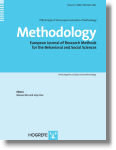
Methodology-European Journal of Research Methods for the Behavioral and Social Sciences
Scope & Guideline
Advancing research excellence in behavioral and social sciences.
Introduction
Aims and Scopes
- Statistical Methodologies:
The journal emphasizes the development and application of advanced statistical techniques, including regression analysis, ANOVA, and Bayesian methods, to enhance the robustness and validity of research findings. - Measurement and Instrumentation:
A core focus is on exploring new methods for measuring psychological constructs and behaviors, ensuring that instruments are both reliable and valid across different contexts. - Mixed Methods Research:
The integration of qualitative and quantitative approaches is a prominent theme, promoting comprehensive methodologies that capture the complexity of social phenomena. - Simulation Studies:
The journal frequently publishes simulation studies that assess the performance of various statistical methods under different conditions, providing critical insights into methodological robustness. - Data Quality and Ethics:
Research addressing data quality, participant vetting procedures, and ethical considerations in data collection is of significant interest, reflecting the journal's commitment to responsible research practices.
Trending and Emerging
- Machine Learning Applications:
The integration of machine learning techniques in social science research is on the rise, with several recent articles exploring their applications for modeling complex data structures and improving predictive accuracy. - Robustness and Sensitivity Analyses:
There is a growing emphasis on robustness checks and sensitivity analyses, which are critical for ensuring the reliability of findings, particularly in the context of violated assumptions and data irregularities. - Advanced Measurement Invariance Techniques:
Recent studies have increasingly focused on measurement invariance, particularly in diverse populations, to ensure that instruments function equivalently across different groups. - Bayesian Methodologies:
The adoption of Bayesian approaches is becoming more prominent, with researchers exploring their advantages for parameter estimation and hypothesis testing, reflecting a shift away from classical statistical paradigms. - Data Simulation and Resampling Methods:
Simulation-based methodologies and resampling techniques, such as bootstrapping, are gaining traction as researchers seek to enhance the accuracy of their estimates and inferential statistics.
Declining or Waning
- Traditional Hypothesis Testing:
While hypothesis testing remains important, there is a noticeable shift towards more nuanced approaches such as Bayesian methods and confidence intervals, leading to fewer articles dedicated to traditional p-value-centric analyses. - Descriptive Statistics:
The emphasis on complex statistical modeling and advanced methodologies has overshadowed simpler descriptive statistics, which are now less frequently discussed in the journal. - Qualitative Research Methods:
Although the journal promotes mixed methods, purely qualitative research methodologies have diminished in prominence, with a stronger focus on quantitative methods and their integration. - Classic Regression Techniques:
There has been a shift towards more sophisticated regression techniques such as Lasso and machine learning approaches, resulting in a decline in the publication of articles focused on classic linear regression models.
Similar Journals

PSYCHOLOGICAL METHODS
Transforming Psychological Inquiry with Cutting-Edge MethodsPsychological Methods, published by the American Psychological Association, is a leading journal in the field of psychology, recognized for its rigorous approach to the methodology of psychological research. With an ISSN of 1082-989X and an E-ISSN of 1939-1463, this esteemed journal facilitates the dissemination of innovative methods and analysis techniques that are critical for advancing psychological science. Its impressive ranking as Q1 in both the History and Philosophy of Science and Psychology (miscellaneous) categories underscores its influence, while its Scopus rank places it in the top 2 out of 97 journals in its field, reflecting its high visibility and importance among researchers, professionals, and students. Although not an open-access journal, Psychological Methods continues to serve as a vital resource for the latest advancements and discussions, aiming to enhance the quality of psychological research globally. With a publication history spanning from 1996 to 2024, it remains a cornerstone for scholars committed to elevating the methodological standards prevalent within the discipline.

BMC Medical Research Methodology
Your Gateway to Cutting-Edge Medical Research MethodologiesBMC Medical Research Methodology is a prestigious open-access journal published by BMC, dedicated to advancing the field of medical research methodologies. Launched in 2001, the journal has established itself as a vital resource for researchers, reflecting its high-quality contributions with a strong Q1 ranking in both Epidemiology and Health Informatics as of 2023. As a scholarly platform, it offers broad access globally, ensuring that the latest developments in research methodology are readily available to professionals, scholars, and students alike. With its commitment to enhancing the rigor and transparency of medical research, BMC Medical Research Methodology plays a critical role in shaping the future of evidence-based practices, making it an essential read for anyone involved in medical research. The journal is based in the United Kingdom at CAMPUS, 4 Crinan St, London N1 9XW, England, and provides comprehensive access options to facilitate the dissemination of knowledge and foster collaboration across the global research community.
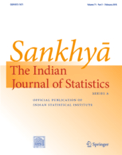
Sankhya-Series A-Mathematical Statistics and Probability
Advancing the Frontiers of Mathematical Statistics and ProbabilitySankhya-Series A-Mathematical Statistics and Probability is a prestigious academic journal published by SPRINGER, situated in the United States. With a focus on the rapidly evolving fields of mathematical statistics and probability, this journal serves as a critical platform for researchers, professionals, and students seeking to disseminate their findings and engage with latest advancements. Although it is not an open access publication, its rigorous peer-review process ensures high-quality content that contributes to the scholarly community. As of 2023, the journal is classified within the Q3 quartile in both Statistics and Probability, and Statistics, Probability and Uncertainty categories, reflecting its relevance and growing influence in the field. Sankhya-Series A showcases a convergence of interdisciplinary approaches, facilitating dialogue among statisticians and mathematicians, making it an essential resource for those committed to the exploration of theoretical and applied statistics. The journal accepts contributions advancing innovative research and methodologies, promoting a deeper understanding of probabilistic models and statistical techniques.

TEST
Elevating the discourse in statistical science since 1992.TEST, published by Springer, is a prestigious academic journal that serves as a vital platform for research in the fields of Statistics and Probability. With an ISSN of 1133-0686 and an E-ISSN of 1863-8260, TEST has been at the forefront of statistical methodology and applications since its inception in 1992. As of 2023, the journal holds a Q2 ranking in both the Statistics and Probability, and Statistics, Probability and Uncertainty categories, affirming its position among the leading scholarly publications in these domains. Although it currently does not offer open access, its rich repository of peer-reviewed articles and innovative research findings continues to attract attention from researchers, professionals, and students alike. Positioned within the competitive landscape of mathematical sciences, TEST aims to advance both theoretical developments and practical applications in statistical science through high-quality publications. Researchers can greatly benefit from the insights and methodologies presented within its pages, as elucidated by its Scopus rankings, placing it in the 56th percentile for Mathematics in Statistics and Probability and 53rd for Decision Sciences. For further inquiries, TEST is headquartered at One New York Plaza, Suite 4600, New York, NY 10004, United States, where it continually strives to contribute to the evolution of statistical research.
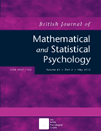
BRITISH JOURNAL OF MATHEMATICAL & STATISTICAL PSYCHOLOGY
Innovating Methodologies for Complex Psychological ResearchThe British Journal of Mathematical & Statistical Psychology, published by Wiley, is a prestigious peer-reviewed journal that plays a pivotal role in advancing the interdisciplinary fields of psychology, mathematics, and statistics. With an ISSN of 0007-1102 and an E-ISSN of 2044-8317, it boasts a Category Quartile ranking of Q1 in diverse areas including Arts and Humanities, Medicine, Psychology, and Statistics and Probability as of 2023, signifying its considerable impact and relevance. This journal provides a platform for the dissemination of high-quality research and innovative methodological advancements that address complex psychological phenomena through rigorous statistical frameworks. It covers a breadth of topics from classic problems to modern data analytic techniques, appealing to researchers, professionals, and students alike. Founded in 1965, the journal continues to thrive global scholarly dialogue until 2024, fostering collaboration among disciplines and enhancing understanding of psychological data. Although it is not an open access journal, its rigorous selection process ensures that only the most significant and impactful research is published, further maintaining its esteemed position within the academic community.
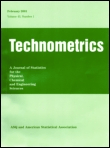
TECHNOMETRICS
Elevating Research in Applied Mathematics and StatisticsTECHNOMETRICS, established in 1959 and published by Taylor & Francis Inc, serves as a premier journal in the fields of applied mathematics, modeling and simulation, and statistics and probability. With its ISSN number 0040-1706 and E-ISSN 1537-2723, the journal has successfully converged over its decades-long history and is recognized for its substantial contributions to the quantitative analysis and application of statistical methods. TECHNOMETRICS is proud to maintain a distinguished reputation, ranking in the Q1 category for 2023 across its relevant fields, and positioning itself within the top 86th percentile in Mathematics _ Statistics and Probability as per Scopus rankings. While this journal currently does not operate under an open access model, it remains a crucial resource for researchers, professionals, and graduate students seeking insights and advancements in the realm of statistical methodologies and applications. Its commitment to disseminating high-quality research ensures it stands as an invaluable platform for innovation and scholarly discourse within the statistical community, making it essential reading for anyone interested in the evolution of applied statistical techniques.

PSYCHOMETRIKA
Cultivating insights that shape the future of psychometrics.PSYCHOMETRIKA, an esteemed journal published by Springer, serves as a premier platform for advancing the field of psychometrics and quantitative psychology. Since its inception in 1936, the journal has maintained its commitment to disseminating high-quality research, making significant contributions to both applied mathematics and psychology, reflected in its distinguished Q1 ranking in relevant categories as of 2023. With an impressive Scopus ranking, positioned at #117 in Applied Mathematics and #62 in General Psychology, it occupies a critical niche for scholars aiming to explore the interplay between statistical methods and psychological measurement. Although not open access, PSYCHOMETRIKA provides a rigorous peer-reviewed environment that fosters innovative research, methodologies, and theories while offering valuable insights relevant to researchers, professionals, and students alike. Prepared to bridge theoretical knowledge with practical application, this journal is a vital resource for those looking to deepen their understanding of psychometric principles and advance their scholarly endeavors in the behavioral sciences.
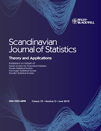
SCANDINAVIAN JOURNAL OF STATISTICS
Fostering collaboration and excellence in statistical research.SCANDINAVIAN JOURNAL OF STATISTICS is a premier publication in the field of statistics, published by Wiley. With an impressive impact factor that reflects its influence, this journal is recognized for its rigorous peer-reviewed research articles that contribute to the advancement of statistical methods and their applications. As a leading resource, the journal spans a wide range of topics within Statistics and Probability, maintaining a strong scholarly presence with a Q1 rank in Statistics and Probability and a Q2 rank in Statistics, Probability and Uncertainty as per the 2023 category quartiles. The journal has been diligently publishing high-quality research since 1996, and now encompasses studies up to 2024, reinforcing its commitment to providing valuable insights for researchers, professionals, and students alike. While the journal does not offer open access, it remains an essential repository of knowledge in statistical sciences, fostering collaboration and innovation within the global academic community.
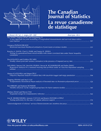
CANADIAN JOURNAL OF STATISTICS-REVUE CANADIENNE DE STATISTIQUE
Empowering Researchers with Rigorous InsightsCanadian Journal of Statistics - Revue Canadienne de Statistique is a prestigious publication in the field of statistics, managed by Wiley. Since its inception in 1973, this journal has served as an essential resource for researchers, practitioners, and students, offering insights into a diverse range of statistical methodologies and applications. With its impact reflected in its 2023 categorization as Q2 in Statistics and Probability and Q3 in Statistics, Probability and Uncertainty, the journal stands out among its peers, exemplifying rigorous standards in empirical research. The journal's ISSN is 0319-5724 and its E-ISSN is 1708-945X, providing a robust platform for the dissemination of knowledge in the field. While it does not offer open access, the journal remains highly regarded and well-cited, contributing significantly to the advancement of statistical theory and practice. As it continues to publish cutting-edge research through to 2024, the Canadian Journal of Statistics is a must-read for anyone seeking to stay informed on the latest trends and developments in statistics.

Methods Data Analyses
Connecting Researchers with Cutting-Edge MethodologiesMethods Data Analyses is a premier open-access journal published by GESIS Leibniz Institute for the Social Sciences, based in Germany. With its focus on advanced methodologies within various fields such as Applied Mathematics, Applied Psychology, Computer Science Applications, and Statistics, this journal plays a pivotal role in disseminating innovative research and practical applications that push the boundaries of quantitative analysis. As of 2023, it proudly holds Q1 status in both Applied Mathematics and Modeling and Simulation, reflecting its high impact and relevance in these disciplines. The journal is committed to promoting open access research since 2013, ensuring that critical methodologies and findings are available to a global audience. With Scopus rankings indicating robust standing across multiple categories, including Statistics and Decision Sciences, Methods Data Analyses stands as an essential resource for researchers, professionals, and students seeking to engage with cutting-edge approaches and frameworks that enhance analytical rigor in their work.